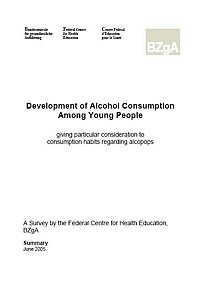Studies
The Federal Centre for Health Education endeavours to make its work as effective as possible. To achieve this goal, there is a need to constantly improve education activities and continuously review the success of the measures.
It is for this reason that we regularly conduct studies.
They make it possible
- To gear the planning and implementation of education measures in the various subject fields to the latest scientific findings,
- To examine whether our measures really do achieve the targeted, health-promoting effects.
Although the questions and the results of these studies therefore always have a direct link to the work of BZgA, they also contain a wealth of information that can be used by the interested public, and particularly by people and institutions working in the field of health prevention.
Consequently, all the studies conducted by BZgA are published.
The studies and evaluation results from the field of sex education, contraception and family planning can be found at: www.forschung.sexualaufklaerung.de
We will be more than pleased to provide further information:
Bundeszentrale für gesundheitliche Aufklärung
Referat 2-25
Ostmerheimer Strasse 220
D-51109 Köln, Germany
E-mail: forschung(at)bzga.de
See below the list of all available studies with at least an englisch short version.
The overall list of all available studies can be found here.
Development of Alcohol Consumption Among Young People
giving particular consideration to consumption habits regarding alcopops
The consumption of spirits-based alcopops among 12 to 17 year-old young people declined significantly between 2004 and 2005, both in terms of frequency and as regards quantity. At the same time, there is an increase in the percentage of respondents who have not drunk these alcopops at all in the past year. 12 to 15 year-olds are reducing their consumption to an even greater extent.
Spirits-based alcopops are primarily no longer being bought because they have become too expensive as a result of the introduction of the tax on alcopops, and because young people are better informed about the associated health risks.
The percentage of young people drinking wine and beer-based alcopops at least once a month is also declining. This decrease is more pronounced among young females than among young males. However, the quantity of alcohol (grams of alcohol per week) consumed by young people in the form of wine/beer-based alcopops has risen from 3.9 g to 5.3 g. This increase is, however, smaller than the decline in the quantity of alcohol consumed in the form of spirits-based alcopops (from 8.5 g in 2004 to 4.2 g in 2005).
Powdered alcopops, which produce a ready-to-drink alcopop beverage when dissolved in water, were consumed by roughly 1% (0.78%) of 12 to 17 year-old young people in the last 30 days prior to the survey in 2005. At that time, it played hardly any role in terms of the alcohol consumption of this age group.
As regards the other types of alcohol covered by the study, it can be seen that the frequency of consumption of beer and spirits remains constant. The frequency of consumption of wine/ sparkling wine and cocktails/long drinks among 12 to 17 year-olds is declining significantly. A decrease in the quantities of alcohol consumed (grams of pure alcohol per week) for the individual types of alcohol is primarily to be observed among young males.
Addition of all the quantities of alcohol consumed indicates that total alcohol consumption (grams of pure alcohol per week) among young people is declining, both including and excluding spirits-based alcopops.
Risky alcohol consumption among 12 to 17 year-old young people decreased in the period covered by the survey. The percentage of young people drinking five or more glasses of alcohol in a row (binge drinking) on at least one occasion in the last 30 days is on the decline, as is the percentage of young people reporting having been drunk at least once in the last three months.
The assessments of the perceived health hazards are changing in different ways as regards risky drinking patterns. In 2005, fewer young people see binge drinking as being a major health hazard than in 2004. In contrast, more young people in 2005 rate drunkenness as a major hazard.
Conclusion: Both the consumption of spirits-based alcopops and alcohol consumption in general are developing in the intended direction. Nevertheless, observation is necessary in order to establish whether these effects are merely transitory. In particular, there will be a need to examine the development of consumption of low-alcohol, spirits-based alcopops and of wine/beer-based alcopops.

 Suche
Suche
